The EQUUS Foundation + GFAS: Working Together
for Equine Rescues and Sanctuaries
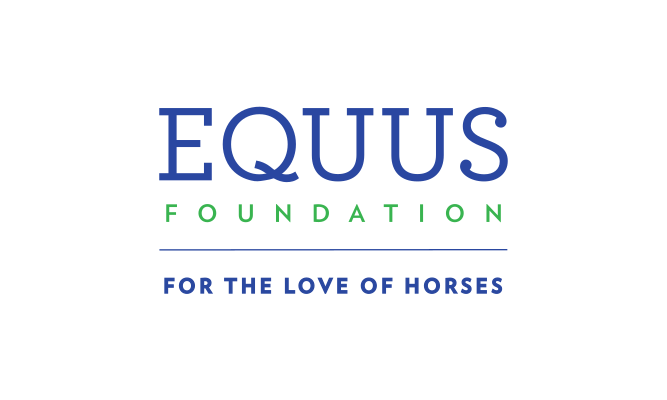 We are pleased to announce that the Global Federation of Animal Sanctuaries (GFAS) has partnered with the EQUUS Foundation! While the missions of both organizations strive to help equine welfare charities help animals, together we can have an even greater impact and provide even more support!
We are pleased to announce that the Global Federation of Animal Sanctuaries (GFAS) has partnered with the EQUUS Foundation! While the missions of both organizations strive to help equine welfare charities help animals, together we can have an even greater impact and provide even more support!
The EQUUS Foundation is a well-known national animal welfare charity 100% dedicated to equine welfare, based in the United States, with a mission to protect America’s horses and strengthen the bond between horses and people. The EQUUS Foundation has long recognized the commitment of equine rescues, sanctuaries, and transition centers to transparency and accountability, and lauded the willingness of these organizations to make comprehensive data about their programs, horse care practices, and governance available for public scrutiny. The EQUUS Foundation empowers equine charities to operate at the highest standards for horse care and service and be fully transparent by providing them with financial support, recognition, guidance, and resources.
Similarly, GFAS Accreditation and Verification also allows equine sanctuaries, rescues, and transition centers a simple, meaningful way to communicate that they are officially recognized as committed, capable, and worthy of support. This applies to how these organizations are perceived by donors, law enforcement, Grantmakers, and the general public. GFAS Verified and Accredited facilities also have access to member benefits, such as specialized insurance programs and eligibility for awards.
The EQUUS Foundation and GFAS are working together to promote and provide resources and support to help enable eligible equine organizations to apply for and receive the benefits of having both GFAS Accredited or Verified status and the EQUUS Foundation Guardian designation. The benefits of support and validation from both organizations are significant! Being officially recognized by both organizations exponentially increases an equine welfare organization’s visibility to important stakeholders. Engagement as an EQUUS Foundation Guardian and the GFAS Accreditation application process, will provide equine welfare organizations with clear, objective and measurable outcomes by which each organization can reach new heights of excellence.
To learn more about, or join, the EQUUS Foundation, visit https://www.equusfoundation.org . The first step in the process of attaining the EQUUS Foundation Guardian designation is to join the Foundation’s Equine Welfare Network at https://www.equusfoundation.org/join-us.php
To learn more about GFAS Accreditation and Verification for equine organizations, see the GFAS website or contact GFAS Program Director-Equine, Daryl Tropea, at
Emergency and Disaster Preparedness-
Are You Ready to Respond?
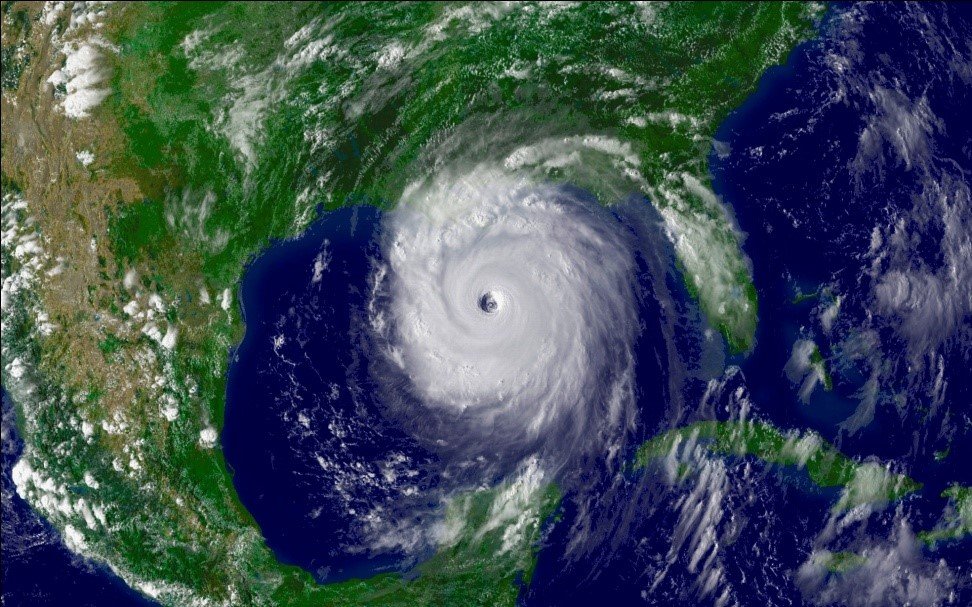 GFAS standards S-4 to S-9 stress the importance of being prepared for both emergencies and disasters that impact sheltered animals and the people that care for them. Preparation must also include learning how to work with first responders and emergency services to help them help you. Recently, the Homes for Horses Coalition hosted a very informative webinar about emergency and disaster preparedness for sanctuaries and rescues. Emergencies require different preparation than disaster situations and this webinar stressed the importance of preparing for your relevant risks.
GFAS standards S-4 to S-9 stress the importance of being prepared for both emergencies and disasters that impact sheltered animals and the people that care for them. Preparation must also include learning how to work with first responders and emergency services to help them help you. Recently, the Homes for Horses Coalition hosted a very informative webinar about emergency and disaster preparedness for sanctuaries and rescues. Emergencies require different preparation than disaster situations and this webinar stressed the importance of preparing for your relevant risks.
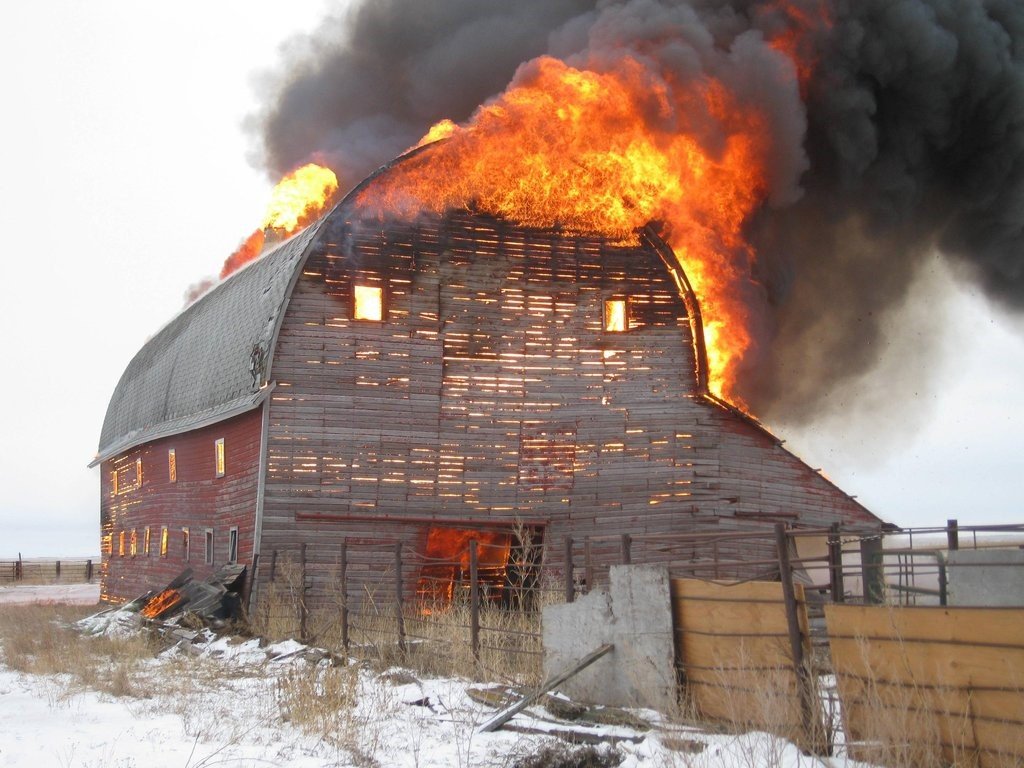 Although the focus was on equines, the preparation information is applicable to all organizations that shelter animals. Three excellent presenters (Dr. Rebecca McConnico, Dr. John Madigan, and Julie Atwood) delivered an overview of the emergencies and disasters likely in geographical regions, how to plan for them, and which emergency agencies will respond.
Although the focus was on equines, the preparation information is applicable to all organizations that shelter animals. Three excellent presenters (Dr. Rebecca McConnico, Dr. John Madigan, and Julie Atwood) delivered an overview of the emergencies and disasters likely in geographical regions, how to plan for them, and which emergency agencies will respond.
While GFAS has samples and assessment forms to help you prepare, this webinar also provided a link to a wealth of preparedness tools and resources provided by the Halter Project. The Halter Project is described as a grass-roots program supporting efforts of communities and agencies to train and prepare for a ready response to, and the care of, animals in everyday emergencies and large-scale disasters.
HALTER Project | Leading Residents to Safety & Preparedness
The presenters also provided an overview of the health Impacts of floods and fires and what is important for sanctuaries and rescues to have in their emergency veterinary supplies. A link to the recording of this valuable webinar will be available soon and can be found on website of the Homes for Horses Coalition at https://homesforhorses.org/.
Additional resources for equine barns are also available at Equine Guelph (University) of Ontario, Canada Barn Fire Prevention-Equine Guelph. Particularly useful is a set of downloadable barn evacuation plan templates that can help a rescue or sanctuary develop your own unique plan. The templates can be found at this link: Barn Evacuation Templates
More Animals Test Positive for Covid
GFAS continues to keep a close eye on Covid in animal populations and would like to share the following information and resources to help our members stay informed. Natural Covid infections have been confirmed in captive animals including: tigers, lions, pumas, snow leopards and mink. Primates are also susceptible, and several gorillas at the San Diego Zoo recently tested positive for Covid. Officials believe the infections likely came from asymptomatic caregivers with Covid.
Safety precautions are strongly recommended for the species mentioned above and in general including: appropriate distancing, cleaning with approved disinfectants, and personal protective equipment. As always, consult your veterinarian regarding questions and concerns. According to the Centers for Disease Control, people with suspected or confirmed coronavirus should avoid contact with wildlife, farmed animals and pets. The following resources provide up to date information on specific animal species:
Centers for Disease Control:
COVID-19 and Animals | CDC
World Organization for Animal Health:
Events in animals: OIE – World Organisation for Animal Health
American Veterinary Medical Association:
SARS-CoV-2 in animals | American Veterinary Medical Association (avma.org)
Zoo and Aquarium All Hazards Preparedness, Response and Recovery:
Considerations for the Management of Non-Domestic Species in Human Care During COVID-19 – ZAHP (aza.org)
Pro-Tip: Small group visits can maximize
your visitor and donor engagement
For most sanctuaries, COVID has crippled tours, visitation, and in-person outreach programming. But for Verified Goodheart Animal Sanctuaries, working around COVID restrictions became an “aha” moment. Taking advantage of GFAS’ partnership with AirBNB, this sanctuary stumbled into a strategic variation on their regular tour structure. Read on to learn how re-thinking your visitor experience can offer a silver lining during this very stormy year and beyond.
 Goodheart Animal Sanctuaries (GHAS) is a farm animal sanctuary based in Worcestershire, UK. In 2020, Covid-19 restrictions meant that we were unable to open our sanctuary doors to the general public in the way that we had previously. New guidelines meant that individuals could only gather in groups of up to 6 in order to minimise the spread of coronavirus.
Goodheart Animal Sanctuaries (GHAS) is a farm animal sanctuary based in Worcestershire, UK. In 2020, Covid-19 restrictions meant that we were unable to open our sanctuary doors to the general public in the way that we had previously. New guidelines meant that individuals could only gather in groups of up to 6 in order to minimise the spread of coronavirus.
Obviously, our usual system of open days was not going to work. Fortunately I had recently attended a webinar hosted by GFAS and AirBnB where I learnt that GFAS verified sanctuaries could host ‘Experiences’ on AirBnB free of charge as a ‘Social Impact Experience’.
As I’m sure you’re aware, AirBnB will only host animal experiences that have animal welfare at the forefront, with hosts agreeing to comply with guidelines designed by AirBnB and World Animal Protection. Hosting an experience through AirBnB has the benefit of providing us with a seamless booking tool, something that we would not have been able to replicate in-house. It was very easy for us to manage bookings using this tool and of course allowed us to cap visitor group sizes to a maximum of 5 people (allowing our staff to make a group of 6).
Moreover, we were able to charge visitors £20 per head for their experience. This proved to be a vital source of income for us during the pandemic as all other events of course had to be cancelled. When speaking with visitors and gathering feedback after their experience, 100% agreed that they were happy to pay that amount as they felt that the experience was ‘high quality’ and ‘really personal’.
We found that we were able to meet a whole host of new supporters due to AirBnB’s advertising – many who visited us were unaware of our charity before the experience, but converted to become supporters on completion of the visit. We were pleasantly surprised by the significant increase in support that was shown after these small group visits as opposed to our usual open day visits. For instance, one lady purchased just over £200 worth of merchandise at the end of her visit despite being unfamiliar with our charity prior to her visit. Another offered to donate a portion of her small business profits to us during the month of January. Others have set up regular donations, joined our membership scheme and offered their voluntary services.
We believe that the small group visit system works so well because it allows supporters to connect with the staff and animals on a personal level. We were able to share a dialogue with each and every visitor and that resulted in forging much stronger relationships moving forward. It also meant that our animals were not constantly surrounded by members of the public, as we had full control over where our group visited and which animals we interacted with. Altogether, this made for a much more enjoyable experience for our staff, our visitors and our rescued animals. We would promote this ‘small group visit’ to any sanctuary as an excellent method of connecting visitors with our rescued animals and the charity as a whole.
If anyone would like to get in touch to discuss small group visits, they are free to email me at kath@goodheart.org.uk
Update on the U.S. Equine Welfare Data Collective – EWDC
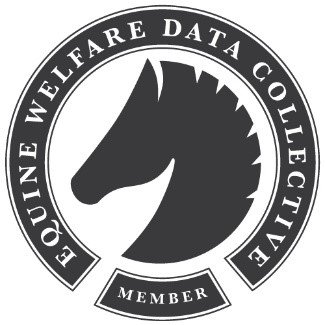 The Equine Welfare Data Collective (EWDC) is a collaboration of several United States organizations working together to collect national data on equine welfare from transition centers, adoption centers, rescues, sanctuaries, shelters, and others. This Data Collective continues to grow and evolve helping all of us to learn more about at-risk equines and the organizations that care for them.
The Equine Welfare Data Collective (EWDC) is a collaboration of several United States organizations working together to collect national data on equine welfare from transition centers, adoption centers, rescues, sanctuaries, shelters, and others. This Data Collective continues to grow and evolve helping all of us to learn more about at-risk equines and the organizations that care for them.
EWDC is now collecting data for July-Dec 2020. If sanctuaries and rescues still need to submit data for Jan-June 2020, you can do so through the same survey link on the EWDC website at:
https://unitedhorsecoalition.org/submit-data/
The most recent report published in July 2020 for the data collection period of July to December 2018, identified a total of 980 nonprofit organizations in the United States (including Puerto Rico) caring for at-risk equines and those in transition. GFAS plans to use this information to better understand how GFAS certified organizations are distributed by state and where we can further our reach.
One of the several “needs” identified (see table below) during this 2018 data collection effort was related to record keeping software. Equine welfare organizations have long struggled to identify the most suitable software for equine rescues and sanctuary, which record keeping system can help them make informed decisions, and how software can help organizations be more effective and efficient.
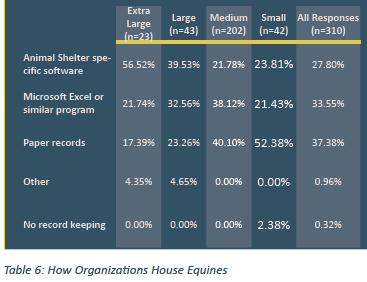 Based on EWDC information and questions posed, EWDC hosted and recorded three excellent and informative webinars on record keeping software that can be viewed at this link: EWDC Animal Shelter Software Education – United Horse Coalition
Based on EWDC information and questions posed, EWDC hosted and recorded three excellent and informative webinars on record keeping software that can be viewed at this link: EWDC Animal Shelter Software Education – United Horse Coalition
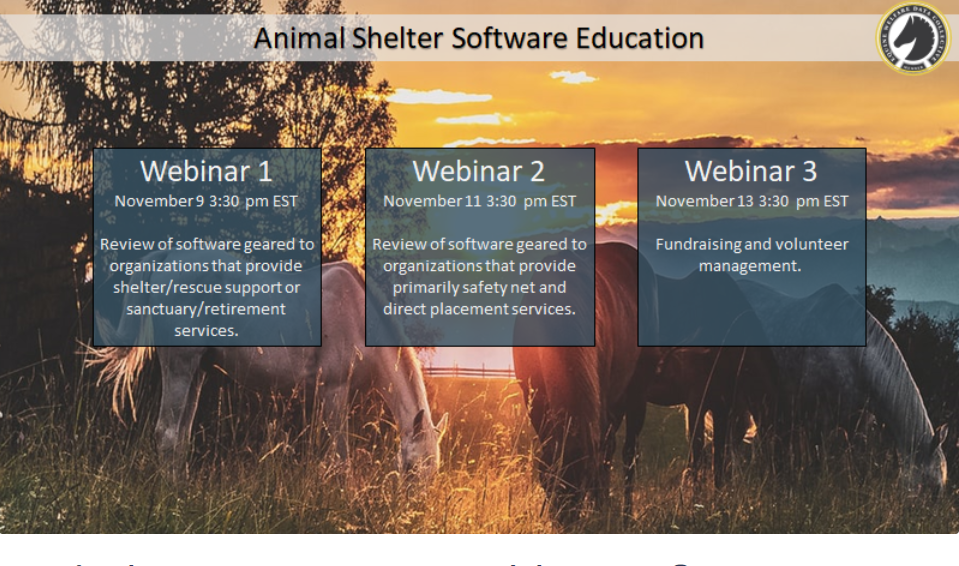 The next report from EWDC will be published for the entire year of 2019 and we look forward to the information it will provide. Emily Stearns, EWDC Program Manager always welcomes questions so contact her at, Email: , Phone: 508-364-967 and/or Website: https://unitedhorsecoalition.org/ewdc/.
The next report from EWDC will be published for the entire year of 2019 and we look forward to the information it will provide. Emily Stearns, EWDC Program Manager always welcomes questions so contact her at, Email: , Phone: 508-364-967 and/or Website: https://unitedhorsecoalition.org/ewdc/.
First GFAS/P.E.A.C.E Webinar Outlines
Accreditation for Farm Sanctuaries and Beyond!
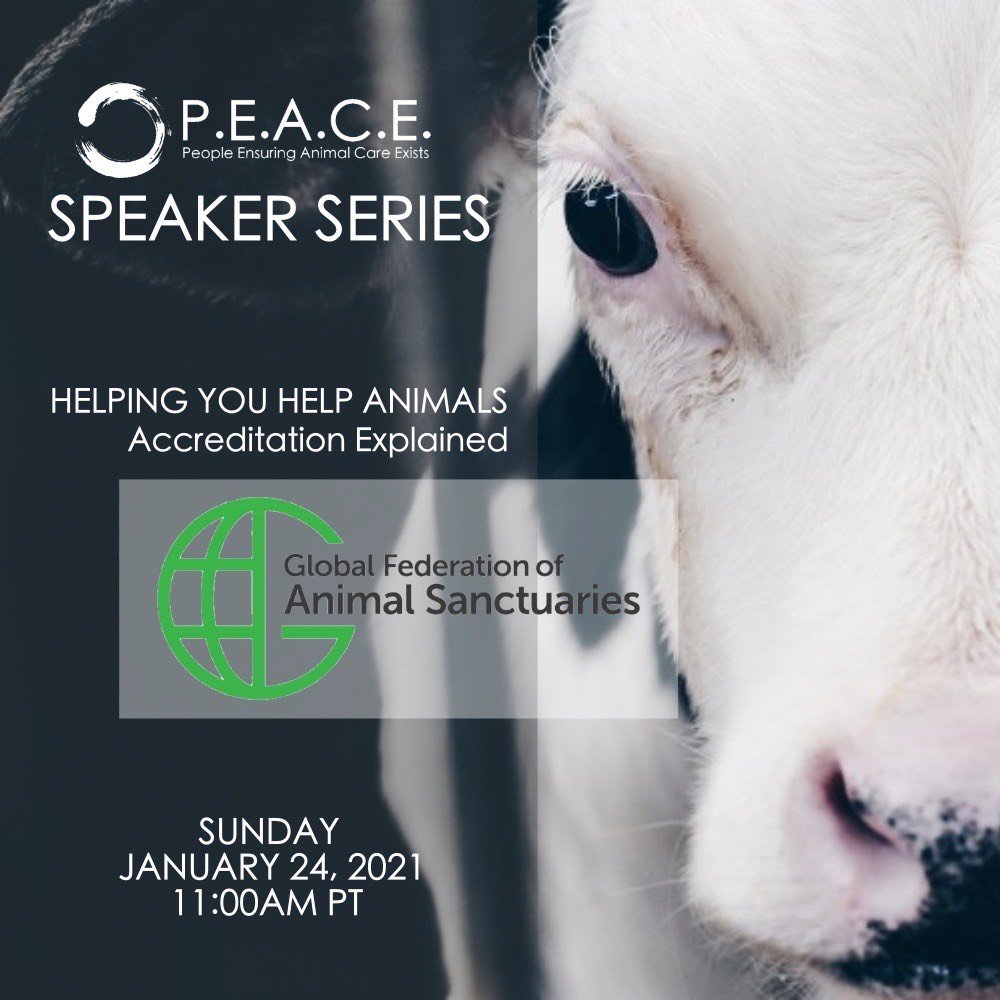 On January 24, 2021, P.E.A.C.E (People Ensuring Animal Care Exists) Canada hosted GFAS for our first webinar together: Helping You Help Animals, Accreditation Explained. The session focused on breaking down the GFAS certification process, particularly for farm sanctuaries, while driving home the benefits of GFAS membership and the need for true sanctuaries to differentiate themselves. While many attendees hailed from the Western Canadian provinces where P.E.A.C.E networks, the webinar is now public on YouTube for anyone interested in certification to view.
On January 24, 2021, P.E.A.C.E (People Ensuring Animal Care Exists) Canada hosted GFAS for our first webinar together: Helping You Help Animals, Accreditation Explained. The session focused on breaking down the GFAS certification process, particularly for farm sanctuaries, while driving home the benefits of GFAS membership and the need for true sanctuaries to differentiate themselves. While many attendees hailed from the Western Canadian provinces where P.E.A.C.E networks, the webinar is now public on YouTube for anyone interested in certification to view.
We are grateful to our friends at P.E.A.C.E for giving us the opportunity to reach even more sanctuaries around the world and to continue elevating sanctuary work.
For more information about P.E.A.C.E visit peacecanada.org
Featured Sanctuaries
Mid-Atlantic Horse Rescue Highlight
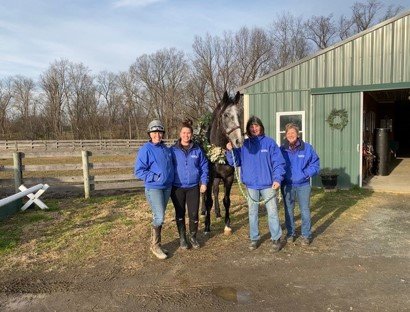 Located on 158 acres in beautiful Eastern Maryland, is GFAS Accredited Mid-Atlantic Horse Rescue (MAHR), an aftercare transition center for Thoroughbred racehorses. MAHR was co-founded in 2002 by Beverly Strauss and Ginny Suarez, life-long horsewomen. Since they were young, these two women have done everything equestrian including dressage, showing, foxhunting and training racehorses. What began as an effort to help three Thoroughbred horses almost 20 years ago, has resulted in a team of devoted staff and trainers who have helped and rehomed more than 2,000 horses to date.
Located on 158 acres in beautiful Eastern Maryland, is GFAS Accredited Mid-Atlantic Horse Rescue (MAHR), an aftercare transition center for Thoroughbred racehorses. MAHR was co-founded in 2002 by Beverly Strauss and Ginny Suarez, life-long horsewomen. Since they were young, these two women have done everything equestrian including dressage, showing, foxhunting and training racehorses. What began as an effort to help three Thoroughbred horses almost 20 years ago, has resulted in a team of devoted staff and trainers who have helped and rehomed more than 2,000 horses to date.
Beverly remains part of the racing community. Her approach to the racing industry is one of pragmatism. Racehorse trainers and owners see her not as a threat to their livelihood, but as someone who can make the lives of their retired horses better. Her persistent but amicable approach has generated a culture of trust giving these ex-racehorses every opportunity for finding new endeavors and new homes.
Beverly and her team are committed to best practices not only in animal care but also nonprofit management. They were one of the original equine organizations to receive Accreditation with GFAS. As the demand for the placement of ex-racehorses continues to grow, MAHR hopes to increase their capacity to help more horses by utilizing a network of satellite farms for rehabilitation and retraining. For more information, please visit, https://midatlantichorserescue.org/.
It’s Baby Season! Wildlife Rescue and Rehabilitation
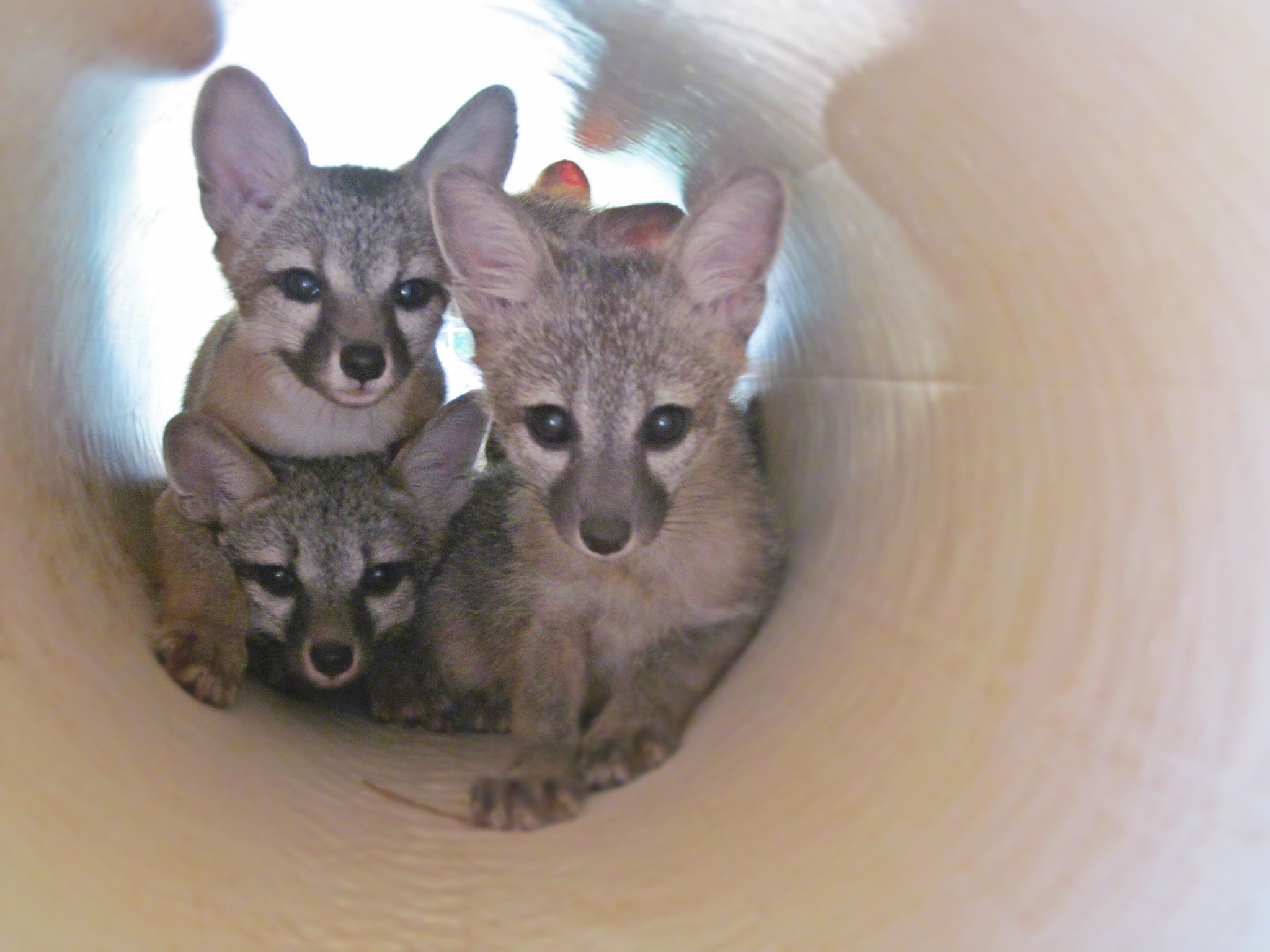
It’s that time of year again when wildlife rehabilitation sanctuaries need extra support. GFAS Accredited, Wildlife Rescue & Rehabilitation’s hospitals in San Antonio and Kendalia, Texas will soon start to fill with young orphaned wildlife. Animals become orphaned or displaced when their mothers are hit by cars, killed by dogs, live trapped and relocated, or shot by hunters. Fortunately, this long-standing Texas institution has over 43 years of experience providing life-saving care to hundreds of native and non-native species.
One characteristic of Wildlife Rescue and Rehabilitation’s mission is to return injured or orphaned animals to the wild whenever possible. This is achieved through time tested protocols which include species-specific formulas and diets, and raising many species of these young animals in a protected outdoor pavilion that provides the fresh air, scents and sounds they would have in a wild setting. Once nursed back to health, animals are released in privately owned areas where no hunting or fishing is allowed, each site is well over one hundred acres and most are over one thousand acres and have been pre-selected to support each species needs for survival.
For animals who are unable to be released, the sanctuary in Kendalia allows for permanent care in spacious, natural settings with minimal human intrusion. Wildlife Rescue & Rehabilitation is closed to the public, and animals are not named, handled or used as educational tools out of respect for their wild nature.
Every year, this organization administers compassionate and skilled care to well over 11,000 wild animals! To learn more and support the lifesaving work of Wildlife Rescue & Rehabilitation, please visit: About Wildlife Rescue & Rehabilitation (wildlife-rescue.org)
GFAS Certifications and Renewals
Over the past month, GFAS has certified one new organization, transitioned one organization from Verified to Accredited status, and renewed eight organizations! Congratulations to all these groups!
New Certification
Purple Haze Standardbred Adoption Program, New York
Transitioned from Verified to Accredited
River’s Wish Animal Sanctuary, Washington
Renewals
Blue Bloods Thoroughbred Adoption and Placement, Inc., North Carolina
Colorado Therapeutic Riding Center, Colorado
Far View Horse Rescue, Colorado
Hidden Acres Rescue for Thoroughbreds, Florida
MidAtlantic Horse Rescue, Maryland
The Donkey Sanctuary of Canada, Ontario
The Horse Shelter, New Mexico
